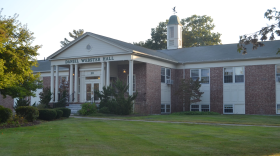Think bagpipes, and you likely think Scotland. But one of the world’s largest bagpipe manufacturers happens to call Nashua, New Hampshire home.
That company, however, is facing an unexpected wrinkle in its international supply chain.
Richard Spaulding is in a mood. When I ask if he knows any good bagpipe jokes, he crisply replies that he doesn’t.
Perhaps his demeanor is on account of some recent bureaucratic hurdles his company has, as of yet, failed to outmaneuver.
A retired state policeman, Spaulding now manages a musical empire named Gibson Bagpipes, the largest bagpipe-maker in North America, and fourth largest in the world. Its pipes are favored by many of the world’s best pipers, as well as local first responder bands.
Gibson launched in Ohio decades ago, but after its founder Jerry Gibson retired, the company relocated to a side street in Nashua.
Their base-line set of pipes starts at about $1,400.
“These become family heirlooms,” says Spaulding, who happens to play drums, not pipes. “If you take care of a set of bagpipes, they’re gonna last you for years.”

Gibson pipes are handmade by a small group of master craftsmen who work lathes and drill finger holes while Spaulding gives me a tour.
The distinct bagpipe sound comes from air being blown through what are called drones, the pipes that point over the shoulder, as well as the chanter, where a player fingers the notes. Gibson and most pipe makers prefer to turn these parts out of something called African Blackwood, a gorgeous, dark wood.
“This is the African Blackwood,” says Spaulding, holding up an 18-inch long rectangle that will get turned into a cylindrical polished drone.
“Very dense,” he explains. “That’s why it resonates the sound. And that’s why bagpipes have been made out of this for hundreds of years.”
African Blackwood, though, is under environmental stress. Last year, CITES, an international consortium that monitors the trade of animal and plant products, moved African Blackwood, along with another bagpipe staple wood, Cocobolo, to a higher risk level. The woods aren’t threatened with extinction just yet, but starting earlier this year, if you want to move this wood across international borders, you need a permit.
And so last December - nearly a year ago - Gibson started its application process with the federal government.
“Had to fill out all that paperwork, with a check for the permits. Mailed it down. They said they never got it.”

It appears as though the application was somehow lost.
Gibson, however, doesn’t learn of this development for nearly four months. Meanwhile, without a permit, the company can continue to make pipes with African Blackwood, but it can’t export them. That’s a problem, because nearly a quarter of Gibson’s bagpipe sales go overseas.
So, in the spring, Gibson resubmitted its application. It also reached out to the offices of Senators Maggie Hassan and Jeanne Shaheen for help.
The senators urged the Departments of Agriculture and Interior to streamline the process. More recently, Governor Chris Sununu also weighed in. It’s been a bipartisan bagpipe effort to get these products moving again.
And then...
“Mail shows up yesterday, there’s the big envelope from Fish and Wildlife with all our permits and the master file, we are all excited we can start shipping internationally again," Spaulding tells me. “I’m going through them...they spelled the city of Nashua wrong.”
He's right Nashua does not have the letter “v” in it.
Nashua does not have the letter 'v' in it.
"The Latin way of spelling it, I think. I don’t know,” says Spaulding, cracking his first laugh of the interview.
He explains that he promptly called his contacts in the federal government, who explained that the little typo is indeed a big deal.
He’s been assured that new permits will be rushed to Gibson.
Until then, international orders remain on hold. And the best bagpipes Nashua has to offer are still only available to domestic customers.
“It is not that we don’t agree with the permitting process, that we don’t want to pay it or anything like that,” says Spaulding. “We just want our permits.”
Special thanks to Eryk Bean of Gibson Bagpipes for playing the tunes heard in the broadcast version of this story.








